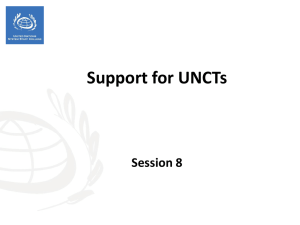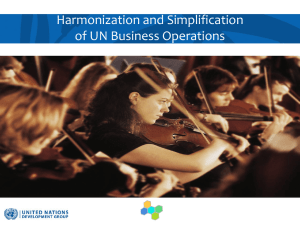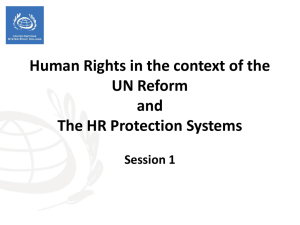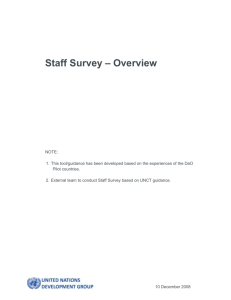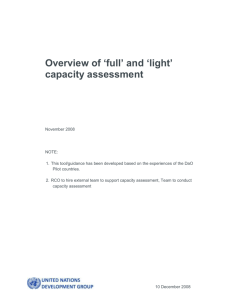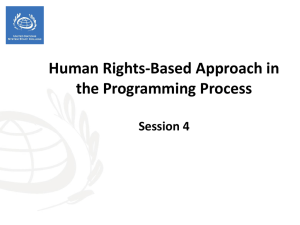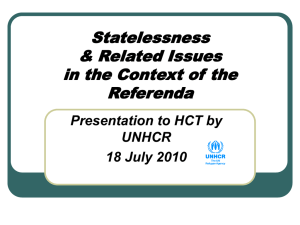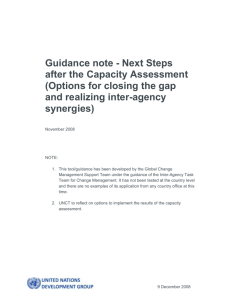on RC/UNCT Working Relations
advertisement
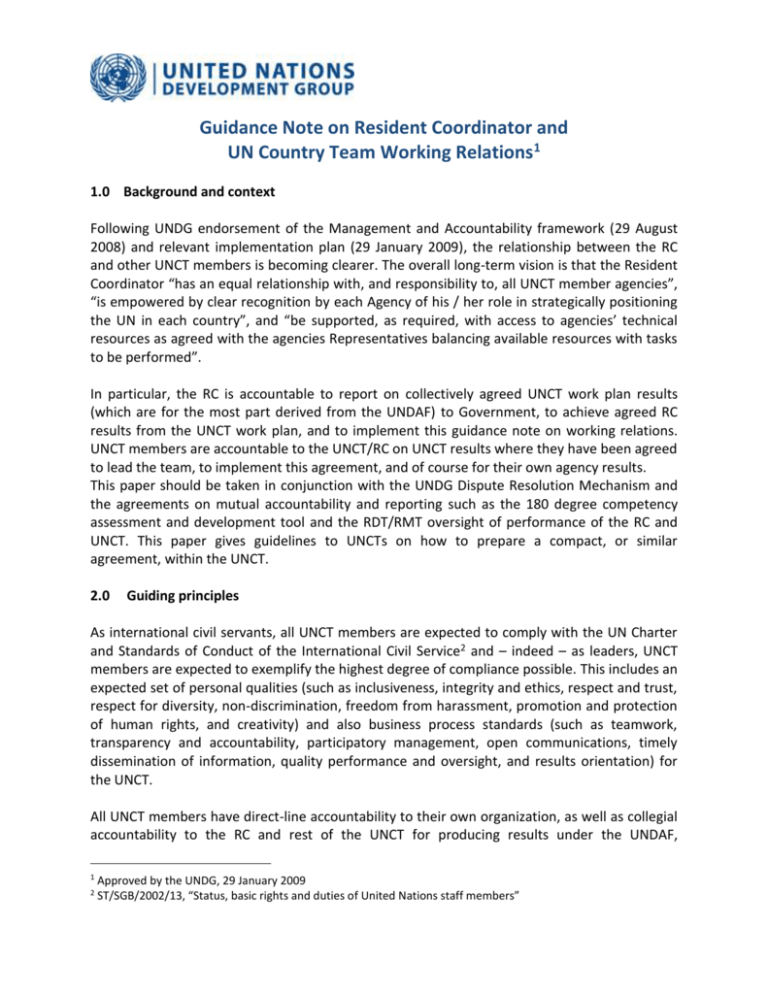
Guidance Note on Resident Coordinator and UN Country Team Working Relations1 1.0 Background and context Following UNDG endorsement of the Management and Accountability framework (29 August 2008) and relevant implementation plan (29 January 2009), the relationship between the RC and other UNCT members is becoming clearer. The overall long-term vision is that the Resident Coordinator “has an equal relationship with, and responsibility to, all UNCT member agencies”, “is empowered by clear recognition by each Agency of his / her role in strategically positioning the UN in each country”, and “be supported, as required, with access to agencies’ technical resources as agreed with the agencies Representatives balancing available resources with tasks to be performed”. In particular, the RC is accountable to report on collectively agreed UNCT work plan results (which are for the most part derived from the UNDAF) to Government, to achieve agreed RC results from the UNCT work plan, and to implement this guidance note on working relations. UNCT members are accountable to the UNCT/RC on UNCT results where they have been agreed to lead the team, to implement this agreement, and of course for their own agency results. This paper should be taken in conjunction with the UNDG Dispute Resolution Mechanism and the agreements on mutual accountability and reporting such as the 180 degree competency assessment and development tool and the RDT/RMT oversight of performance of the RC and UNCT. This paper gives guidelines to UNCTs on how to prepare a compact, or similar agreement, within the UNCT. 2.0 Guiding principles As international civil servants, all UNCT members are expected to comply with the UN Charter and Standards of Conduct of the International Civil Service2 and – indeed – as leaders, UNCT members are expected to exemplify the highest degree of compliance possible. This includes an expected set of personal qualities (such as inclusiveness, integrity and ethics, respect and trust, respect for diversity, non-discrimination, freedom from harassment, promotion and protection of human rights, and creativity) and also business process standards (such as teamwork, transparency and accountability, participatory management, open communications, timely dissemination of information, quality performance and oversight, and results orientation) for the UNCT. All UNCT members have direct-line accountability to their own organization, as well as collegial accountability to the RC and rest of the UNCT for producing results under the UNDAF, 1 2 Approved by the UNDG, 29 January 2009 ST/SGB/2002/13, “Status, basic rights and duties of United Nations staff members” UNDG Guidance Note on RC and UNCT Working Relations recognizing that a well-functioning UNCT allows each organization to be more effective than acting alone. The UNCT will assign various leadership roles to its members on programmatic and management issues. 3.0 Resident Coordinator The RC has an equal relationship with, and responsibility to, all UNCT members. The RC “on behalf of the UN System (UNS), and in consultation with country representatives of the UNS, assumes overall responsibility for, and coordination of, the operational activities for development of the UNS carried out at the country level.”3 The RC is responsible for coordination of the UNCT in strategy, planning, implementation and monitoring and evaluation of development programmes at the country level, contained in the UNDAF. The RC should provide overall leadership, programme oversight, advocacy, resource mobilization and allocations for UNDAF, and lead the UNCT in monitoring, evaluation and reporting of UNCT progress on the UNDAF. The RC leads the UNCT in using tools for increased coherence in the country (e.g. CCA, HACT, and common services). 3.1 RC Roles and Responsibilities should be clearly spelled out and include the following: 1. Representing the Secretary-General to Government 2. Representing the UNCT as a group 3. Leading the team in strategic development of the UNDAF [and joint programmes within it], taking the final decision on strategic focus if consensus cannot be reached 4. Advocating and mobilising resources for the UNDAF, supporting UNCT priorities 5. Coordinating UNDAF implementation with the Theme Group lead agencies and the UNCT more generally 6. Leading UNCT-wide monitoring, evaluation and reporting on the UNDAF results 7. Representing and supporting inclusion of non-resident agencies 8. [if there is a One Fund] leading a consultative process on allocations from the One Fund and making final decision if consensus cannot be reached 9. Coordinates [to be inserted by OCHA] When the RC is the Designated Official for Security (DO) he/she is accountable to the SecretaryGeneral through the USG-DSS for the management of the UN security system in the country. As DO, he/she will coordinate actions to ensure the safety, security and well-being of all staff and families of the United Nations system in the country, convene and lead the work of the interagency Security Management Team (SMT) for effective joint action on all security-related aspects and ensure proper planning, implementation follow-through and reporting. The RC, in partnership with the UNCT, advocates the goals, norms and standards of the UN system. The RC, on behalf of the UNCT, promotes the development of a wide range of 3 ACC Guidelines (1999), para 9, RC Job Description and Principles of Accountability Page 2 of 6 UNDG Guidance Note on RC and UNCT Working Relations partnerships to advance all programmes of the United Nations, including mobilising resources for the programmes of the UNCT to complement agencies’ own efforts and advocates for funds. The RC is the primary interlocutor for the UNCT with the Head of State or Government in support of the UNCT, its members and its UNDAF results, accompanied by agency representatives when agency specific matters are discussed.4 Government’s prerogative to call on individual agency representatives is not affected, and agency Representatives retain the possibility to have direct access to Heads of State / Government and all appropriate central and line ministries and agencies on matters within their mandate. In the case of a crisis, individual agency representatives may also work directly with top government leaders, as necessary. The UN system agencies should come together in humanitarian situations, and organise themselves through the IASC cluster approach. In such cases the RC may be designated as HC and all UNCT partners will be part of the cluster system as will key non-UN partners, following IASC practice. The RC may have representational responsibilities for agencies present or not, based on agreements with each agency at the country and headquarters. The RC and the UNCT should ensure inclusive measures to work closely with NRAs, to be fully informed of the mandate, priorities and requirements of the agency and promote active partnerships in meeting national priorities, according to the country context. At the same time, NRAs will take necessary measures to engage with the RC and UNCT, ensuring that they have the requisite level of technical staff at headquarters/regional/sub-regional level as appropriate to support the work of the UNCT when called upon, and are in dialogue with the UNCT about country visits. The functioning of the UNCT should ensure regular communications with all active NRAs, through both electronic means and face to face, as appropriate. The RC may be granted additional responsibilities on behalf of another agency at their request and agreements between the agencies. The RC in leadership role of the UNCT will uphold the interests of all agencies and not give preference to any agency in the UNCT. In the case of prolonged absence of the RC, a Resident Coordinator ad interim will be assigned. This person will carry out the duties of the Resident Coordinator while continuing his/her own work, and receives support from the RC Office and the rest of the UNCT. The RC a.i. should have access to all the information and other resources that the RC would have. 4.0 UN Country Team The UNCT ensures interagency coordination and decision making at the country level. The main purpose of the Country Team is for individual agencies to plan and work together, as part of the Resident Coordinator system, to ensure the delivery of tangible results in support of the development agenda of the Government. 4 A/55/950 (1997), Action 10(b); ACC Guidelines (1999), para 17 Page 3 of 6 UNDG Guidance Note on RC and UNCT Working Relations The UNCT membership, roles and responsibilities must also be laid out clearly within each UNCT. These will include accountability to each other and the RC, taking responsibility for elements of the RC/UNCT work plan, particularly in oversight of subsidiary groups, mobilization of resources for the UNDAF and UNCT plans, and taking part in mutual assessments. This will not prejudice their relationship with their own agency. 4.1 UNCT Membership According to the ACC guidelines on the functioning of the RC system, “the UNCT is composed of representatives of the UN funds and programmes, specialized agencies and other UN entities accredited to a given country. It could also include representatives of the Bretton Woods institutions (see GA resolution 53/192, preamble 6)”. The UNCT will ensure full participation of all other UN entities active in a given country in the decision making process concerning strategic and programmatic issues. UN Country Team meetings will include all representatives of the UN funds and programmes, specialized agencies and other UN entities active in a given country. It should also include representatives of the Bretton Woods institutions. These representatives must be a UN staff member, be nominated by their agency to represent, and be empowered with decision making authority. Mechanisms should be established to ensure all agencies can fully participate in the UNCT consultations and decision making processes and are informed through regular communications and information sharing. Some UNCT topics (e.g. common services, security) and actions (e.g. 180 degree assessment) only pertain to Representatives resident in the country so those topics will only be discussed by those individuals. 4.2 UNCT roles and responsibilities: The UNCT may wish to set out specific Terms of Reference for particular roles undertaken by – or for – the UNCT, for example: Oversee development and implementation of the UNDAF, endorsing the annual work plans; oversee work of Theme Groups (and participate and lead specific groups); oversee the work of functional groups such as Communication, M&E and the Operations Management Team (OMT); review the overall performance of the UNCT and propose and take action for enhancing its performance based on agreed upon management performance indicators. The UNCT makes decisions through a consultative process, at least once a month. UNCT members develop operational programmes for development to support UNDAF priorities, noting that additional activities may be required complementary to UNDAF priorities for sector priorities. The UNCT will help develop proposals regarding pooling country level fund raising and joint financing, based on the agreed needs and priorities of the country, as expressed in the UNDAF. 5.0 Accountability Page 4 of 6 UNDG Guidance Note on RC and UNCT Working Relations All UNCT members, including the RC, are accountable for their roles in the team, particularly those members that take on leadership roles (e.g. in Theme Groups). RCs and UNCT members will be appraised on their substantive performance in their contribution to the team by an inter-agency appraisal meeting of the RDT/RMT5, which includes designated HQ officials. As part of this appraisal process, RC/UNCT working relations will be assessed using the 180-degree assessment mechanism. Towards this end, UNCT Members will: 1. Plan annual key results as a UNCT and as individuals and agree on results for the RC; 2. Participate in 180 degree assessments; 3. Report on results in appraisal forms in reviewing their own progress and for appraisal of RC; 4. Support each other and the team in improving competencies identified in the 180 degree assessments and appraisals of the RC and UNCT by the RDT/RMT. 6.0 RC System Support A UNCT compact should set out the specific parameters for UNCT Coordination Support/Unit and workings of sub-groups (especially Theme Groups) of the UNCT. The following might be included: 6.1 Resident Coordinator Office6 To coordinate the work of the UN system at the country level, each RC/UNCT should have a Resident Coordinator Office to support these roles and demands. UNCT members will actively support the RC within the context of the UNDAF results framework, including in technical support to achieve agreed UNCT results and in analysis, planning, tracking and reporting processes, information management, communication and advocacy. This Office should have the minimum staffing and resources required to complete this important coordination function. Technical expertise on substantive issues should be provided by agency staff, rather than the RC Office, which should have a supportive/facilitative role. When the UNCT agrees on an activity an agency with the requisite capacity should be identified to implement on behalf of the team. 6.2 Theme Groups and other subsidiary groups of the UNCT As tasked by the UNCT, the UN Theme Groups carry out programme design, implementation, monitoring and evaluation for each of the UNDAF priorities. The UNCT member leading the 5 RMT = Regional Managers Team, which include Regional Directors and relevant senior managers with direct supervisory responsibilities for agency engagement at country level. 6 The Implementation Plan of the Management and Accountability agreement specifies that a typology of RC Offices will be prepared to guide this decision-making Page 5 of 6 UNDG Guidance Note on RC and UNCT Working Relations Theme Group assumes responsibility and is accountable for the agreed work plan results and follow-up on results. The Chair of the UN Theme Group should report to the UNCT on a regular basis to brief, discuss and agree on any proposed actions and follow up. Other groups / networks of the UNCT might cover Monitoring and Evaluation, Communication or Common Services. Page 6 of 6
